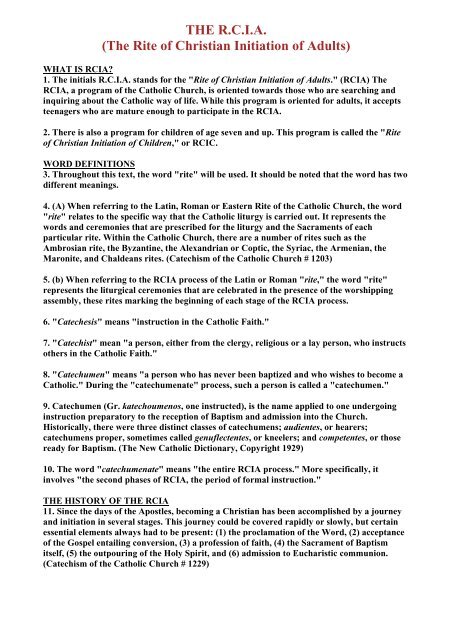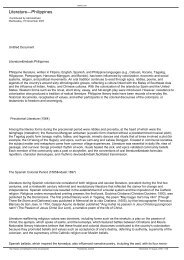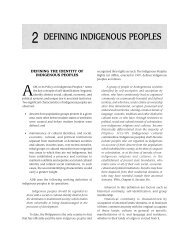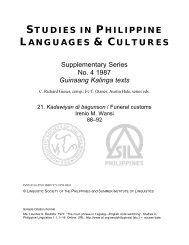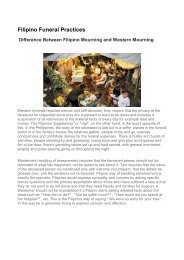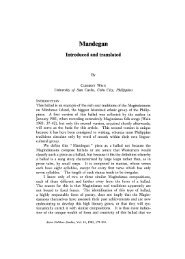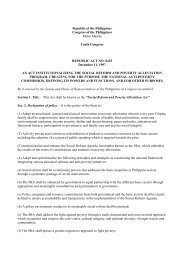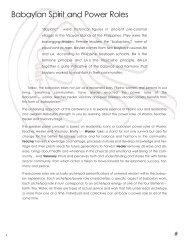HERE - The Roman Catholic church in the Philippines
HERE - The Roman Catholic church in the Philippines
HERE - The Roman Catholic church in the Philippines
Create successful ePaper yourself
Turn your PDF publications into a flip-book with our unique Google optimized e-Paper software.
THE R.C.I.A.<br />
(<strong>The</strong> Rite of Christian Initiation of Adults)<br />
WHAT IS RCIA?<br />
1. <strong>The</strong> <strong>in</strong>itials R.C.I.A. stands for <strong>the</strong> "Rite of Christian Initiation of Adults." (RCIA) <strong>The</strong><br />
RCIA, a program of <strong>the</strong> <strong>Catholic</strong> Church, is oriented towards those who are search<strong>in</strong>g and<br />
<strong>in</strong>quir<strong>in</strong>g about <strong>the</strong> <strong>Catholic</strong> way of life. While this program is oriented for adults, it accepts<br />
teenagers who are mature enough to participate <strong>in</strong> <strong>the</strong> RCIA.<br />
2. <strong>The</strong>re is also a program for children of age seven and up. This program is called <strong>the</strong> "Rite<br />
of Christian Initiation of Children," or RCIC.<br />
WORD DEFINITIONS<br />
3. Throughout this text, <strong>the</strong> word "rite" will be used. It should be noted that <strong>the</strong> word has two<br />
different mean<strong>in</strong>gs.<br />
4. (A) When referr<strong>in</strong>g to <strong>the</strong> Lat<strong>in</strong>, <strong>Roman</strong> or Eastern Rite of <strong>the</strong> <strong>Catholic</strong> Church, <strong>the</strong> word<br />
"rite" relates to <strong>the</strong> specific way that <strong>the</strong> <strong>Catholic</strong> liturgy is carried out. It represents <strong>the</strong><br />
words and ceremonies that are prescribed for <strong>the</strong> liturgy and <strong>the</strong> Sacraments of each<br />
particular rite. With<strong>in</strong> <strong>the</strong> <strong>Catholic</strong> Church, <strong>the</strong>re are a number of rites such as <strong>the</strong><br />
Ambrosian rite, <strong>the</strong> Byzant<strong>in</strong>e, <strong>the</strong> Alexandrian or Coptic, <strong>the</strong> Syriac, <strong>the</strong> Armenian, <strong>the</strong><br />
Maronite, and Chaldeans rites. (Catechism of <strong>the</strong> <strong>Catholic</strong> Church # 1203)<br />
5. (b) When referr<strong>in</strong>g to <strong>the</strong> RCIA process of <strong>the</strong> Lat<strong>in</strong> or <strong>Roman</strong> "rite," <strong>the</strong> word "rite"<br />
represents <strong>the</strong> liturgical ceremonies that are celebrated <strong>in</strong> <strong>the</strong> presence of <strong>the</strong> worshipp<strong>in</strong>g<br />
assembly, <strong>the</strong>se rites mark<strong>in</strong>g <strong>the</strong> beg<strong>in</strong>n<strong>in</strong>g of each stage of <strong>the</strong> RCIA process.<br />
6. "Catechesis" means "<strong>in</strong>struction <strong>in</strong> <strong>the</strong> <strong>Catholic</strong> Faith."<br />
7. "Catechist" mean "a person, ei<strong>the</strong>r from <strong>the</strong> clergy, religious or a lay person, who <strong>in</strong>structs<br />
o<strong>the</strong>rs <strong>in</strong> <strong>the</strong> <strong>Catholic</strong> Faith."<br />
8. "Catechumen" means "a person who has never been baptized and who wishes to become a<br />
<strong>Catholic</strong>." Dur<strong>in</strong>g <strong>the</strong> "catechumenate" process, such a person is called a "catechumen."<br />
9. Catechumen (Gr. katechoumenos, one <strong>in</strong>structed), is <strong>the</strong> name applied to one undergo<strong>in</strong>g<br />
<strong>in</strong>struction preparatory to <strong>the</strong> reception of Baptism and admission <strong>in</strong>to <strong>the</strong> Church.<br />
Historically, <strong>the</strong>re were three dist<strong>in</strong>ct classes of catechumens; audientes, or hearers;<br />
catechumens proper, sometimes called genuflectentes, or kneelers; and competentes, or those<br />
ready for Baptism. (<strong>The</strong> New <strong>Catholic</strong> Dictionary, Copyright 1929)<br />
10. <strong>The</strong> word "catechumenate" means "<strong>the</strong> entire RCIA process." More specifically, it<br />
<strong>in</strong>volves "<strong>the</strong> second phases of RCIA, <strong>the</strong> period of formal <strong>in</strong>struction."<br />
THE HISTORY OF THE RCIA<br />
11. S<strong>in</strong>ce <strong>the</strong> days of <strong>the</strong> Apostles, becom<strong>in</strong>g a Christian has been accomplished by a journey<br />
and <strong>in</strong>itiation <strong>in</strong> several stages. This journey could be covered rapidly or slowly, but certa<strong>in</strong><br />
essential elements always had to be present: (1) <strong>the</strong> proclamation of <strong>the</strong> Word, (2) acceptance<br />
of <strong>the</strong> Gospel entail<strong>in</strong>g conversion, (3) a profession of faith, (4) <strong>the</strong> Sacrament of Baptism<br />
itself, (5) <strong>the</strong> outpour<strong>in</strong>g of <strong>the</strong> Holy Spirit, and (6) admission to Eucharistic communion.<br />
(Catechism of <strong>the</strong> <strong>Catholic</strong> Church # 1229)
12. This <strong>in</strong>itiation of believers <strong>in</strong>to <strong>the</strong> <strong>Catholic</strong> Faith has varied greatly through <strong>the</strong> centuries<br />
accord<strong>in</strong>g to circumstances. In <strong>the</strong> first centuries of <strong>the</strong> Church, Christian <strong>in</strong>itiation saw<br />
considerable development. <strong>The</strong> entire RCIA process covered a long period of time. It <strong>in</strong>cluded<br />
a series of "rites", <strong>the</strong>se be<strong>in</strong>g liturgical landmarks along <strong>the</strong> path of prepar<strong>in</strong>g those who<br />
were never baptized and who wished to become <strong>Catholic</strong>s. <strong>The</strong> process was completed when<br />
<strong>the</strong> Sacraments of Christian <strong>in</strong>itiation were celebrated. (Catechism of <strong>the</strong> <strong>Catholic</strong> Church #<br />
1230)<br />
13. <strong>The</strong> second Vatican Council's <strong>in</strong>volvement consisted of restor<strong>in</strong>g with<strong>in</strong> <strong>the</strong> Lat<strong>in</strong> Church<br />
<strong>the</strong> "catechumenate for adults" (<strong>the</strong> several dist<strong>in</strong>ct steps of <strong>the</strong> entire RCIA process). <strong>The</strong><br />
rites for <strong>the</strong>se stages are to be found <strong>in</strong> <strong>the</strong> manual, <strong>the</strong> Rite of Christian Initiation of Adults<br />
(RCIA). (Catechism of <strong>the</strong> <strong>Catholic</strong> Church # 1232)<br />
THE RCIA OF TODAY<br />
14. Today <strong>in</strong> all of <strong>the</strong> Rites, Lat<strong>in</strong> and Eastern, <strong>the</strong> Christian <strong>in</strong>itiation of adults beg<strong>in</strong>s with<br />
<strong>the</strong>ir entry <strong>in</strong>to <strong>the</strong> RCIA process and reaches its completion <strong>in</strong> a s<strong>in</strong>gle celebration of <strong>the</strong><br />
three Sacraments of <strong>in</strong>itiation: Baptism, Confirmation, and <strong>the</strong> Eucharist. [CF. AG 14; CIC,<br />
cann. 851; 865; 866] (Catechism of <strong>the</strong> <strong>Catholic</strong> Church # 1233)<br />
15. Christian <strong>in</strong>itiation is accomplished by three Sacraments toge<strong>the</strong>r: Baptism which is <strong>the</strong><br />
beg<strong>in</strong>n<strong>in</strong>g of new life; Confirmation which is its streng<strong>the</strong>n<strong>in</strong>g; and <strong>the</strong> Eucharist which<br />
nourishes <strong>the</strong> disciple with Christ's Body and Blood for his transformation <strong>in</strong> Christ.<br />
(Catechism of <strong>the</strong> <strong>Catholic</strong> Church # 1275)<br />
16. In <strong>the</strong> Eastern rites <strong>the</strong> Christian <strong>in</strong>itiation of <strong>in</strong>fants also beg<strong>in</strong>s with Baptism followed<br />
immediately by Confirmation and <strong>the</strong> Eucharist, while <strong>in</strong> <strong>the</strong> <strong>Roman</strong> rite it is followed by<br />
years of "catechesis" (<strong>in</strong>struction <strong>in</strong> <strong>the</strong> <strong>Catholic</strong> Faith) before be<strong>in</strong>g completed later by<br />
Confirmation and <strong>the</strong> Eucharist, <strong>the</strong> summit of <strong>the</strong>ir Christian <strong>in</strong>itiation. [Cf. CIC, cann. 851,<br />
2§; 868] (Catechism of <strong>the</strong> <strong>Catholic</strong> Church # 1233)<br />
THE THREEFOLD PURPOSE OF THE RCIA<br />
17. Through <strong>the</strong> RCIA, <strong>the</strong> <strong>Catholic</strong> Church extends an <strong>in</strong>vitation to:<br />
18. (A) Those who are not associated with a community of faith and who wish to become<br />
<strong>Catholic</strong>s;<br />
19. (B) Those who want to convert to <strong>Catholic</strong>ism from ano<strong>the</strong>r faith. For <strong>the</strong>m, <strong>the</strong> RCIA is<br />
<strong>the</strong> process through which <strong>the</strong>y will become full fledged <strong>Catholic</strong>s; and<br />
20. (C) Those who want to learn about <strong>the</strong> <strong>Catholic</strong> faith. <strong>The</strong>se <strong>in</strong>dividuals may be <strong>in</strong>volved<br />
<strong>in</strong> <strong>in</strong>terfaith marriages or simply are actively <strong>in</strong>volved <strong>in</strong> a Church of a different<br />
denom<strong>in</strong>ation and <strong>the</strong>y want to learn more about <strong>the</strong> <strong>Catholic</strong> faith <strong>in</strong> <strong>the</strong> spirit of<br />
ecumenism.<br />
21. <strong>The</strong> RCIA fills all <strong>the</strong>se needs of those who are search<strong>in</strong>g and <strong>in</strong>quir<strong>in</strong>g about <strong>the</strong> <strong>Catholic</strong><br />
faith.<br />
SETTING UP THE RCIA<br />
22. To implement <strong>the</strong> RCIA program, a parish has to set up a welcom<strong>in</strong>g committee. <strong>The</strong><br />
members of <strong>the</strong> committee should sh<strong>in</strong>e <strong>in</strong> <strong>the</strong> fruit of <strong>the</strong> Holy Spirit, namely <strong>in</strong> "love, joy,<br />
peace, patience, k<strong>in</strong>dness, generosity, faithfulness, gentleness and self- control. [Gal. 5:22-3]<br />
O<strong>the</strong>r desirable qualities that <strong>the</strong> members should possess consist of be<strong>in</strong>g practic<strong>in</strong>g<br />
<strong>Catholic</strong>s, be<strong>in</strong>g mature <strong>in</strong> <strong>the</strong>ir faith, be<strong>in</strong>g team oriented, be<strong>in</strong>g loyal to <strong>the</strong> teach<strong>in</strong>gs of <strong>the</strong><br />
Church, be<strong>in</strong>g humble, respectful, prayerful and knowledgeable.
23. To ensure <strong>the</strong> proper function<strong>in</strong>g of <strong>the</strong> committee, its members must execute certa<strong>in</strong><br />
roles. <strong>The</strong> Committee should have an RCIA director who manages <strong>the</strong> program. It should<br />
have a spiritual director who can be contacted when <strong>in</strong> need. It should have a number of<br />
catechists to <strong>in</strong>struct o<strong>the</strong>rs <strong>in</strong> <strong>the</strong> <strong>Catholic</strong> way of life. It should have sponsors or godparents.<br />
Hospitality members are required to welcome <strong>the</strong> newcomers. One member can attend to<br />
public relations while ano<strong>the</strong>r plans <strong>the</strong> liturgy. Fruitful committee normally have pray<strong>in</strong>g<br />
partners as part of <strong>the</strong> team. <strong>The</strong>se and o<strong>the</strong>r roles can be executed by any number of<br />
members, <strong>the</strong> size of <strong>the</strong> committee depend<strong>in</strong>g entirely on <strong>the</strong> need and <strong>the</strong> size of <strong>the</strong> parish.<br />
EVANGELIZING<br />
24. <strong>The</strong> members of <strong>the</strong> committee are called to evangelize <strong>in</strong> response to <strong>the</strong> great<br />
commission of Jesus to all <strong>the</strong> faithful. "Go <strong>the</strong>refore and make disciples of all nations,<br />
baptiz<strong>in</strong>g <strong>the</strong>m <strong>in</strong> <strong>the</strong> name of <strong>the</strong> Fa<strong>the</strong>r and of <strong>the</strong> Son and of <strong>the</strong> Holy Spirit, and teach<strong>in</strong>g<br />
<strong>the</strong>m to obey everyth<strong>in</strong>g that I have commanded you." [Mt. 28:19-20]<br />
25. To evangelize as a <strong>Catholic</strong> means more than witness<strong>in</strong>g to o<strong>the</strong>rs! It means to be a liv<strong>in</strong>g<br />
"example" by "shar<strong>in</strong>g" and "witness<strong>in</strong>g" to o<strong>the</strong>rs regard<strong>in</strong>g one's faith <strong>in</strong> Jesus.<br />
26. (A) BY EXAMPLE: Many converts have expressed that <strong>the</strong>ir reason for hav<strong>in</strong>g become<br />
<strong>Catholic</strong>s was because <strong>the</strong>y were attracted to <strong>the</strong> <strong>Catholic</strong> way of life by <strong>the</strong> example of<br />
<strong>Catholic</strong>s. <strong>The</strong>refore, at home, at work, dur<strong>in</strong>g leisure, at all times, it is important for <strong>the</strong><br />
members of <strong>the</strong> Church to always live <strong>the</strong>ir faith <strong>in</strong> a personal daily relationship with <strong>the</strong><br />
Lord Jesus.<br />
27. (B) BY WITNESSING: Members must be prepared to witness by shar<strong>in</strong>g with o<strong>the</strong>rs<br />
<strong>the</strong>ir faith experience. This means expla<strong>in</strong><strong>in</strong>g how <strong>the</strong> <strong>Catholic</strong> way of life has permitted <strong>the</strong>m<br />
to experience spiritual growth <strong>in</strong> <strong>the</strong>ir personal relationship with <strong>the</strong> Lord Jesus.<br />
28. God's gifts are to be shared with <strong>the</strong> world. As a light <strong>in</strong> <strong>the</strong> world, every member of <strong>the</strong><br />
<strong>Catholic</strong> Faith are obligated by <strong>the</strong> promise that <strong>the</strong>y have made dur<strong>in</strong>g <strong>the</strong> Sacrament of<br />
Confirmation to spread and defend <strong>the</strong>ir faith <strong>in</strong> Christ. Jesus said, "Is a lamp brought <strong>in</strong> to<br />
be put under <strong>the</strong> bushel basket, or under <strong>the</strong> bed, and not on <strong>the</strong> lampstand?" [Mk. 4:21; Mt.<br />
5:15-6; Lk. 8:16, 11:33; 1 Pet. 2:12]<br />
29. (C) BY SHARING: Members must be practic<strong>in</strong>g <strong>Catholic</strong>s. This means that <strong>the</strong>y worship<br />
on Sunday and holy days with o<strong>the</strong>rs by participat<strong>in</strong>g <strong>in</strong> <strong>the</strong> celebration of <strong>the</strong> Holy Mass that<br />
is <strong>the</strong> focal po<strong>in</strong>t of <strong>the</strong> <strong>Catholic</strong> faith.<br />
30. Evangeliz<strong>in</strong>g also requires that one knows <strong>the</strong> <strong>Catholic</strong> faith. This qualifies <strong>the</strong> members<br />
who need to answer <strong>the</strong> questions of those who are <strong>in</strong>quir<strong>in</strong>g. <strong>Catholic</strong>s are encouraged to<br />
become knowledgeable <strong>in</strong> <strong>the</strong> Catechism of <strong>the</strong> <strong>Catholic</strong> Church, <strong>in</strong> <strong>the</strong> Canon Laws, <strong>in</strong> <strong>the</strong><br />
Church Councils and even <strong>in</strong> Papal Encyclicals.<br />
THE SACRAMENTS OF INITIATION<br />
31. <strong>The</strong>re are three Sacraments of Christian Initiation. Baptism, Confirmation, and <strong>the</strong> Holy<br />
Eucharist are <strong>the</strong> Sacraments of Christian <strong>in</strong>itiation. <strong>The</strong>y ground <strong>the</strong> common vocation of all<br />
Christ's disciples, a vocation to hol<strong>in</strong>ess and to <strong>the</strong> mission of evangeliz<strong>in</strong>g <strong>the</strong> world. <strong>The</strong>y<br />
confer <strong>the</strong> graces needed for <strong>the</strong> life accord<strong>in</strong>g to <strong>the</strong> Spirit dur<strong>in</strong>g this life as pilgrims on <strong>the</strong><br />
march towards <strong>the</strong> homeland. (Catechism of <strong>the</strong> <strong>Catholic</strong> Church # 1533)<br />
32. <strong>The</strong> focus of <strong>the</strong> RCIA committee, when it concerns conversion <strong>in</strong>to <strong>the</strong> <strong>Catholic</strong> Faith, is<br />
to prepare <strong>the</strong> newcomers so <strong>the</strong>y can receive <strong>the</strong> Sacraments of Baptism, Confirmation and<br />
<strong>the</strong> Holy Eucharist. <strong>The</strong>se Sacraments are normally celebrated <strong>in</strong> a s<strong>in</strong>gle service dur<strong>in</strong>g <strong>the</strong><br />
Easter Vigil.
THE LITURGICAL CALENDAR<br />
33. As a general rule, <strong>the</strong> RCIA process, usually of a one year duration or less, follows <strong>the</strong><br />
flow of <strong>the</strong> Liturgical Calendar <strong>in</strong> <strong>the</strong> Lectionary cycle. <strong>The</strong> program of <strong>in</strong>itiation normally<br />
starts <strong>in</strong> May or June around Tr<strong>in</strong>ity Sunday. <strong>The</strong> catechumen (new converts) receive <strong>the</strong><br />
Sacraments of Baptism, Confirmation and <strong>the</strong> Holy Eucharist on Easter Vigil. <strong>The</strong> program<br />
ends on Pentecost Sunday.<br />
34. <strong>The</strong> follow<strong>in</strong>g represents <strong>the</strong> complete cycle of a Liturgical Calendar.<br />
Tr<strong>in</strong>ity,<br />
Corpus Christi,<br />
Ord<strong>in</strong>ary Time,<br />
Christ <strong>the</strong> K<strong>in</strong>g,<br />
Advent,<br />
Christmas,<br />
Holy Family,<br />
Mary, Mo<strong>the</strong>r of God,<br />
Epiphany of <strong>the</strong> Lord,<br />
Baptism of <strong>the</strong> Lord,<br />
Ord<strong>in</strong>ary Time,<br />
Ash Wednesday,<br />
Lent,<br />
Holy Week,<br />
Mass of <strong>the</strong> Lord's Supper,<br />
Good Friday,<br />
Easter Vigil,<br />
Easter Sunday,<br />
Easter Season,<br />
Ascension,<br />
Pentecost.<br />
THE RCIA PROCESS<br />
35. <strong>The</strong> "RCIA process" (<strong>the</strong> catechumenate) is divided <strong>in</strong>to four dist<strong>in</strong>ct phases. <strong>The</strong><br />
progress, from one phase to ano<strong>the</strong>r, of <strong>the</strong> "catechumens" (unbaptized <strong>in</strong>quirers) and <strong>the</strong><br />
"candidates" (<strong>in</strong>quirers com<strong>in</strong>g from ano<strong>the</strong>r Christian denom<strong>in</strong>ation) is measured by <strong>the</strong><br />
appropriate liturgical rites.<br />
PHASE ONE<br />
36. Those who are consider<strong>in</strong>g whe<strong>the</strong>r or not <strong>the</strong>y have a call<strong>in</strong>g to jo<strong>in</strong> <strong>the</strong> <strong>Catholic</strong> Faith<br />
are called "<strong>in</strong>quirers." <strong>The</strong>y are called "<strong>in</strong>quirers" because <strong>in</strong> this phase, <strong>the</strong>y will have <strong>the</strong><br />
opportunity to get acqua<strong>in</strong>ted with some <strong>Catholic</strong>s, <strong>in</strong>clud<strong>in</strong>g <strong>the</strong> members of <strong>the</strong> RCIA<br />
committee and <strong>the</strong> o<strong>the</strong>r <strong>in</strong>quirers. This is a time that is set aside to provide <strong>the</strong> <strong>in</strong>quirers with<br />
<strong>the</strong> opportunity to obta<strong>in</strong> answers to questions that <strong>the</strong>y may have regard<strong>in</strong>g <strong>the</strong> <strong>Catholic</strong><br />
Faith. As some would put it, it is a time to "break <strong>the</strong> ice" so that everyone can become<br />
comfortable with each o<strong>the</strong>rs, both, <strong>the</strong> <strong>Catholic</strong>s and <strong>the</strong> seekers.<br />
37. Because of <strong>the</strong> nature of <strong>the</strong> first phase, it is known under different names. Some call it <strong>the</strong><br />
"Inquiry Phase" because it is "before <strong>the</strong> catechumenate or evangelization phase." Some call<br />
it <strong>the</strong> "Pre-Catechumenate Phase" because it is "before <strong>the</strong> period of formal tra<strong>in</strong><strong>in</strong>g dur<strong>in</strong>g<br />
<strong>the</strong> RCIA process." And o<strong>the</strong>rs call it <strong>the</strong> "Pre-Evangelization Phase" because it is "before<br />
<strong>the</strong> members of <strong>the</strong> RCIA Committee beg<strong>in</strong> to evangelize to <strong>the</strong> newcomers." In summary,<br />
phase one is a preparatory phase for all those who are <strong>in</strong>volved.
THE FIRST LITURGICAL RITE<br />
38. <strong>The</strong> transition from <strong>the</strong> first phase to <strong>the</strong> second phase is called <strong>the</strong> "Rite of Acceptance<br />
<strong>in</strong>to <strong>the</strong> Catechumenate." This <strong>in</strong>volves a celebration that marks <strong>the</strong> <strong>in</strong>tention of <strong>the</strong> <strong>in</strong>quirers<br />
to cont<strong>in</strong>ue <strong>the</strong>ir journey towards full membership <strong>in</strong> <strong>the</strong> <strong>Catholic</strong> Faith through <strong>the</strong><br />
reception of <strong>the</strong> Sacraments of Baptism, Confirmation and Communion.<br />
PHASE TWO<br />
39. <strong>The</strong> second phase of <strong>the</strong> RCIA process is called <strong>the</strong> "Catechumenate." This phase <strong>in</strong>volves<br />
<strong>the</strong> period of formal tra<strong>in</strong><strong>in</strong>g <strong>in</strong> <strong>the</strong> <strong>Catholic</strong> way of life. It is <strong>the</strong> phase dur<strong>in</strong>g which <strong>the</strong><br />
"catechumens" (those never baptized) and <strong>the</strong> "candidates" (those baptized <strong>in</strong> ano<strong>the</strong>r<br />
denom<strong>in</strong>ation) study <strong>the</strong> <strong>Catholic</strong> Faith.<br />
40. Dur<strong>in</strong>g this phase, studies are focused on <strong>the</strong> Lord Jesus, His teach<strong>in</strong>gs, <strong>the</strong> teach<strong>in</strong>gs of<br />
<strong>the</strong> <strong>Catholic</strong> Church and <strong>the</strong> Sacraments. <strong>The</strong>se studies normally touch on <strong>the</strong> subjects of <strong>the</strong><br />
writ<strong>in</strong>gs of <strong>the</strong> early Church Fa<strong>the</strong>rs, <strong>Catholic</strong> dogmas, <strong>the</strong> <strong>in</strong>fallibility of <strong>the</strong> Pope, <strong>the</strong> Virg<strong>in</strong><br />
Mary, Purgatory, etc...<br />
41. At this stage, <strong>the</strong> catechumens and candidates are assigned a sponsor, a member of <strong>the</strong><br />
RCIA Committee, who will walk <strong>the</strong> faith journey with <strong>the</strong>m on a one-to-one basis.<br />
42. Dur<strong>in</strong>g this period, <strong>the</strong> catechumens and candidates partly participate <strong>in</strong> <strong>the</strong> Sunday<br />
celebration of <strong>the</strong> Holy Mass. <strong>The</strong>y participate <strong>in</strong> <strong>the</strong> Liturgy of <strong>the</strong> Word, but are excluded<br />
from participat<strong>in</strong>g <strong>in</strong> <strong>the</strong> Sacrament of <strong>the</strong> Holy Eucharist. After <strong>the</strong> homily, <strong>the</strong> priest<br />
dismisses <strong>the</strong>m with a bless<strong>in</strong>g. <strong>The</strong>n <strong>the</strong>y leave <strong>the</strong> ga<strong>the</strong>r<strong>in</strong>g to fur<strong>the</strong>r study <strong>the</strong> mean<strong>in</strong>g of<br />
<strong>the</strong> Scripture read<strong>in</strong>gs. <strong>The</strong> study of <strong>the</strong> deeper mean<strong>in</strong>g of <strong>the</strong> Word of God is called <strong>the</strong><br />
"break<strong>in</strong>g open <strong>the</strong> Word."<br />
THE SECOND LITURGICAL RITE<br />
43. At <strong>the</strong> end of <strong>the</strong> second phase, two liturgical rites take place. <strong>The</strong> first is <strong>the</strong> "Rite of<br />
Send<strong>in</strong>g." This rite consists of a celebration dur<strong>in</strong>g which time, with a bless<strong>in</strong>g, <strong>the</strong> parish<br />
priest sends forth <strong>the</strong> candidates and <strong>the</strong> catechumens to <strong>the</strong> Bishop for <strong>the</strong> "Rite of Election"<br />
that will take place on <strong>the</strong> First Sunday of Lent.<br />
44. On <strong>the</strong> First Sunday of Lent, at <strong>the</strong> Ca<strong>the</strong>dral, <strong>the</strong> Bishop (or his representative) officially<br />
calls <strong>the</strong> catechumens and candidates to <strong>the</strong> Sacraments <strong>in</strong> <strong>the</strong> "Rite of Election." <strong>The</strong><br />
catechumens who accept this <strong>in</strong>vitation <strong>in</strong>to <strong>the</strong> <strong>Catholic</strong> Faith are now called "<strong>The</strong> Elect."<br />
45. "<strong>The</strong> Elect" are those who, after <strong>the</strong> "Rite of Election" dur<strong>in</strong>g Lent, are prepar<strong>in</strong>g<br />
<strong>the</strong>mselves for full <strong>in</strong>itiation <strong>in</strong>to <strong>the</strong> <strong>Catholic</strong> Church.<br />
PHASE THREE<br />
46. <strong>The</strong> third phase of <strong>the</strong> catechumenate (RCIA process) is called <strong>the</strong> "Purification and<br />
Enlightenment" phase. This phase usually takes place dur<strong>in</strong>g <strong>the</strong> forty days of <strong>the</strong> Lenten<br />
Season.<br />
47. Dur<strong>in</strong>g <strong>the</strong> Lenten Season, <strong>in</strong> preparation for <strong>the</strong> joy of Easter that approaches, <strong>the</strong><br />
faithful are called to express <strong>the</strong>ir s<strong>in</strong>cere repentance through <strong>the</strong>ir hearts ra<strong>the</strong>r than<br />
through outward expressions that may not reflect <strong>the</strong> true nature of <strong>the</strong>ir <strong>in</strong>ner be<strong>in</strong>gs. <strong>The</strong>ir<br />
repentance may be expressed <strong>in</strong> forms of fast<strong>in</strong>g, prayer, sacrifices, charity towards o<strong>the</strong>rs,<br />
etc...<br />
48. Dur<strong>in</strong>g this time of personal reconciliation and renewal <strong>in</strong> <strong>the</strong> Body of Christ, <strong>the</strong> elects<br />
are <strong>in</strong>troduced to a number of prayers that may benefit <strong>the</strong>ir spiritual growth.<br />
49. Dur<strong>in</strong>g <strong>the</strong> Lenten Season, <strong>the</strong> focus of <strong>the</strong> RCIA process changes. Instruction <strong>in</strong>to <strong>the</strong><br />
<strong>Catholic</strong> Faith is replaced with an emphasis on conversion. Those who are already baptized<br />
take this opportunity to receive <strong>the</strong> Sacrament of Confession.
50. Dur<strong>in</strong>g <strong>the</strong> celebration of <strong>the</strong> Holy Mass on <strong>the</strong> Third, Fourth and Fifth Sundays of Lent,<br />
<strong>the</strong> Church assembly celebrates <strong>the</strong> scrut<strong>in</strong>ies with <strong>the</strong> elect. <strong>The</strong>se rituals mark <strong>the</strong> f<strong>in</strong>al<br />
preparation of <strong>the</strong> "catechumens" (those not baptized) to receive <strong>the</strong> Sacraments of <strong>in</strong>itiation.<br />
<strong>The</strong>se scrut<strong>in</strong>ies <strong>in</strong>clude exorcism prayers for deliverance from s<strong>in</strong>, evil and evil <strong>in</strong>fluences <strong>in</strong><br />
order to streng<strong>the</strong>n <strong>the</strong> faithful to <strong>the</strong> Word of God. Dur<strong>in</strong>g <strong>the</strong> exorcisms, <strong>the</strong> elect kneel <strong>in</strong><br />
humility as <strong>the</strong> community prays for <strong>the</strong>m.<br />
PREPARATION FOR THE EASTER VIGIL<br />
51. On Holy Saturday morn<strong>in</strong>g or at ano<strong>the</strong>r convenient time before <strong>the</strong> <strong>in</strong>itiation ceremony,<br />
a time is set aside for <strong>the</strong> catechumens to spiritually prepare <strong>the</strong>mselves for <strong>the</strong> Easter Vigil.<br />
This time is set aside as a retreat, for spiritual reflection and for <strong>the</strong> celebration of <strong>the</strong><br />
preparatory rites that is called <strong>the</strong> "ephphatha." [Mk. 7:34-5]<br />
52. "Ephphatha" means "be opened," this be<strong>in</strong>g a symbol of open<strong>in</strong>g <strong>the</strong> senses. Dur<strong>in</strong>g <strong>the</strong><br />
ephphatha, <strong>the</strong> ears and mouths of <strong>the</strong> elect are blessed so <strong>the</strong>y may hear <strong>the</strong> Word of God<br />
and profess it. This is <strong>the</strong> moment when <strong>the</strong> catechumens declare <strong>the</strong>ir baptismal names.<br />
53. As for <strong>the</strong> ceremonies of Baptism and Marriage, it is <strong>the</strong> custom <strong>in</strong> many parishes to set<br />
aside a time to practice for <strong>the</strong> Easter Vigil <strong>in</strong>itiation.<br />
54. In large parishes, especially where <strong>the</strong>re are many catechumens who are com<strong>in</strong>g <strong>in</strong>to <strong>the</strong><br />
Church, <strong>the</strong> preparatory rites can greatly decrease <strong>the</strong> amount of time that will be required at<br />
<strong>the</strong> Easter Vigil. As a general rule, <strong>the</strong> liturgy dur<strong>in</strong>g <strong>the</strong> celebration of <strong>the</strong> Easter Vigil can<br />
take up a m<strong>in</strong>imum of two to three hours.<br />
55. At <strong>the</strong> Easter Vigil, <strong>the</strong>re is <strong>the</strong> "Service of Light," <strong>the</strong> "Liturgy of <strong>the</strong> Word," <strong>the</strong><br />
"Celebration of <strong>the</strong> Sacraments of Initiation and <strong>the</strong> Rite of Reception," <strong>the</strong> "Celebration of<br />
Confirmation," and f<strong>in</strong>ally <strong>the</strong> "Liturgy of <strong>the</strong> Eucharist."<br />
TRANSITION TO PHASE FOUR<br />
56. In <strong>the</strong> <strong>Catholic</strong> liturgy, <strong>the</strong> celebration of <strong>the</strong> glorious Resurrection of <strong>the</strong> Lord Jesus at<br />
<strong>the</strong> Easter Vigil is <strong>the</strong> climax of <strong>the</strong> liturgical year. Dur<strong>in</strong>g this celebration, <strong>the</strong> Church<br />
welcomes <strong>the</strong> elect and <strong>the</strong> candidates <strong>in</strong>to full sacramental life with <strong>the</strong> <strong>Catholic</strong> faithful. This<br />
is when <strong>the</strong> catechumen receive <strong>the</strong> Sacrament of Baptism. This is when <strong>the</strong> candidates and<br />
<strong>the</strong> catechumen receive <strong>the</strong> Sacraments of Confirmation and <strong>the</strong> Holy Eucharist.<br />
57. From this time on, <strong>the</strong> elect who have been <strong>in</strong>itiated <strong>in</strong>to <strong>the</strong> <strong>Catholic</strong> Church are called<br />
neophytes. "Neophyte" means "newly planted." It means that <strong>the</strong> elects are now <strong>in</strong> full<br />
communion with <strong>the</strong> Church.<br />
58. Now, <strong>the</strong> "neophytes" will cont<strong>in</strong>ue <strong>the</strong>ir formation <strong>in</strong> <strong>the</strong> fourth phase of <strong>the</strong> RCIA<br />
process until <strong>the</strong> celebration of <strong>the</strong> Solemnity of Pentecost.<br />
PHASE FOUR<br />
59. <strong>The</strong> f<strong>in</strong>al phase of <strong>the</strong> RCIA process is <strong>the</strong> "mystagogy." In Greek, "mystagogy" means<br />
"enter<strong>in</strong>g more deeply <strong>in</strong>to <strong>the</strong> mysteries." Dur<strong>in</strong>g this phase, members of <strong>the</strong> Committee<br />
familiarize <strong>the</strong> "neophytes" to <strong>the</strong> different parish m<strong>in</strong>istries. This process allows <strong>the</strong><br />
neophytes to choose how <strong>the</strong>y want to become actively <strong>in</strong>volved <strong>in</strong> parish life.<br />
SAFEGUARDING THE SACRAMENTS OF INITIATION
60. "Baptism, <strong>the</strong> Eucharist, and <strong>the</strong> sacrament of Confirmation toge<strong>the</strong>r constitute <strong>the</strong><br />
'Sacraments of Christian <strong>in</strong>itiation,' whose unity must be safeguarded. It must be expla<strong>in</strong>ed to<br />
<strong>the</strong> faithful that <strong>the</strong> reception of <strong>the</strong> sacrament of Confirmation is necessary for <strong>the</strong><br />
completion of baptismal grace. [Cf. <strong>Roman</strong> Ritual, Rite of Confirmation (OC), Introduction<br />
1] For 'by <strong>the</strong> sacrament of Confirmation, [<strong>the</strong> baptized] are more perfectly bound to <strong>the</strong><br />
Church and are enriched with a special strength of <strong>the</strong> Holy Spirit. Hence <strong>the</strong>y are, as true<br />
witnesses of Christ, more strictly obliged to spread and defend <strong>the</strong> faith by word and deed.'"<br />
[LG 11; Cf. OC, Introduction 2.] (Catechism of <strong>the</strong> <strong>Catholic</strong> Church # 1285)<br />
61. "S<strong>in</strong>ce <strong>the</strong> beg<strong>in</strong>n<strong>in</strong>g of <strong>the</strong> Church, adult Baptism has been <strong>the</strong> common practice where<br />
<strong>the</strong> proclamation of <strong>the</strong> Gospel is still new. <strong>The</strong> catechumenate (preparation for Baptism)<br />
<strong>the</strong>refore occupies an important place. This <strong>in</strong>itiation <strong>in</strong>to Christian faith and life should<br />
dispose <strong>the</strong> catechumen to receive <strong>the</strong> gift of God <strong>in</strong> Baptism, Confirmation, and <strong>the</strong><br />
Eucharist." (Catechism of <strong>the</strong> <strong>Catholic</strong> Church # 1247)<br />
62. "<strong>The</strong> catechumenate, or formation of catechumens, aims at br<strong>in</strong>g<strong>in</strong>g <strong>the</strong>ir conversion and<br />
faith to maturity, <strong>in</strong> response to <strong>the</strong> div<strong>in</strong>e <strong>in</strong>itiative and <strong>in</strong> union with an ecclesial community.<br />
<strong>The</strong> catechumenate is to be 'a formation <strong>in</strong> <strong>the</strong> whole Christian life... dur<strong>in</strong>g which <strong>the</strong><br />
disciples will be jo<strong>in</strong>ed to Christ <strong>the</strong>ir teacher. <strong>The</strong> catechumens should be properly <strong>in</strong>itiated<br />
<strong>in</strong>to <strong>the</strong> mystery of salvation and <strong>the</strong> practice of <strong>the</strong> evangelical virtues, and <strong>the</strong>y should be<br />
<strong>in</strong>troduced <strong>in</strong>to <strong>the</strong> life of faith, liturgy, and charity of <strong>the</strong> People of God by successive sacred<br />
rites.'" [AG 14; cf. RCIA 19; 98.] (Catechism of <strong>the</strong> <strong>Catholic</strong> Church # 1248)<br />
63. "Catechumens "are already jo<strong>in</strong>ed to <strong>the</strong> Church, <strong>the</strong>y are already of <strong>the</strong> household of<br />
Christ, and are quite frequently already liv<strong>in</strong>g a life of faith, hope, and charity." [AG 14 # 5.]<br />
"With love and solicitude mo<strong>the</strong>r Church already embraces <strong>the</strong>m as her own."" [LG 14 # 3;<br />
cf. CIC, cann. 206; 788 # 3.] (Catechism of <strong>the</strong> <strong>Catholic</strong> Church # 1249)<br />
64. "<strong>The</strong> holy Eucharist completes <strong>the</strong> Christian <strong>in</strong>itiation. Those who have been raised to <strong>the</strong><br />
dignity of <strong>the</strong> royal priesthood by Baptism and configured more deeply to Christ by<br />
Confirmation participate with <strong>the</strong> whole community <strong>in</strong> <strong>the</strong> Lord's own sacrifice by means of<br />
<strong>the</strong> Eucharist." (Catechism of <strong>the</strong> <strong>Catholic</strong> Church # 1322)<br />
RELATED CANON LAWS<br />
65. "To be admitted to baptism, an adult must have manifested <strong>the</strong> <strong>in</strong>tention to receive<br />
baptism, must be adequately <strong>in</strong>structed <strong>in</strong> <strong>the</strong> truths of <strong>the</strong> faith and <strong>in</strong> <strong>the</strong> duties of a<br />
christian, and tested <strong>in</strong> <strong>the</strong> christian life over <strong>the</strong> course of <strong>the</strong> catechumenate. <strong>The</strong> person<br />
must moreover be urged to have sorrow for personal s<strong>in</strong>s." (Canon 865 §1)<br />
66. "An adult <strong>in</strong> danger of death may be baptised if, with some knowledge of <strong>the</strong> pr<strong>in</strong>cipal<br />
truths of <strong>the</strong> faith, he or she has <strong>in</strong> some manner manifested <strong>the</strong> <strong>in</strong>tention to receive baptism<br />
and promises to observe <strong>the</strong> requirements of <strong>the</strong> christian religion." (Canon 865 §2)<br />
67. "Unless <strong>the</strong>re is a grave reason to <strong>the</strong> contrary, immediately after receiv<strong>in</strong>g baptism an<br />
adult is to be confirmed, to participate <strong>in</strong> <strong>the</strong> celebration of <strong>the</strong> Eucharist and to receive holy<br />
communion." (Canon Law # 866)<br />
PARISH INVOLVEMENT<br />
68. <strong>The</strong> future and success of <strong>the</strong> RCIA Committees depends on <strong>the</strong> active <strong>in</strong>volvement of <strong>the</strong><br />
faithful. For <strong>the</strong> grace of God to work accord<strong>in</strong>g to <strong>the</strong> Div<strong>in</strong>e Plan, it must be manifested<br />
through human be<strong>in</strong>gs who are ready to become <strong>in</strong>struments of light for o<strong>the</strong>rs. If you would<br />
like to volunteer on <strong>the</strong> RCIA Committee, contact your parish office and ask for <strong>the</strong> name of<br />
<strong>the</strong> RCIA coord<strong>in</strong>ator.
69. If you would like to <strong>in</strong>quire about <strong>the</strong> <strong>Catholic</strong> Faith or you would like to convert to<br />
<strong>Catholic</strong>ism, contact a local parish office and ask when <strong>the</strong> next RCIA session will take place.<br />
If you wish to talk to someone beforehand, ask for <strong>the</strong> name of <strong>the</strong> RCIA coord<strong>in</strong>ator and<br />
how he/she may be contacted.<br />
RCIA FLEXIBILITY<br />
70. <strong>The</strong> Rite of Christian Initiation is not written <strong>in</strong> solid rock. It can be amended as needed <strong>in</strong><br />
cases of emergencies. For example, a dy<strong>in</strong>g person may not be able to wait until Easter Vigil<br />
to receive <strong>the</strong> Sacraments of Initiation. As such, <strong>the</strong> Christian <strong>in</strong>itiation may take place at <strong>the</strong><br />
person's death bed, ei<strong>the</strong>r at home or <strong>in</strong> <strong>the</strong> hospital.<br />
71. <strong>The</strong> RCIA program was created for <strong>the</strong> benefit of <strong>the</strong> <strong>in</strong>quirers. As such, <strong>the</strong> program<br />
may need to be adjusted accord<strong>in</strong>g to <strong>the</strong> special needs of <strong>the</strong> <strong>in</strong>dividual. This flexibility is a<br />
marvellous example of how <strong>the</strong> grace of God fluctuates accord<strong>in</strong>g to <strong>the</strong> needs of <strong>the</strong><br />
<strong>in</strong>dividuals. No one, if <strong>in</strong>capacitated, should be denied access to <strong>the</strong> gift of <strong>the</strong> Sacraments. If<br />
some cannot go to <strong>the</strong> Sacraments of <strong>the</strong> <strong>Catholic</strong> Church, <strong>the</strong>n <strong>the</strong> Sacraments should be<br />
brought to <strong>the</strong>m!<br />
Ref.: http://www.catholicdoors.com/courses/rcia.htm


